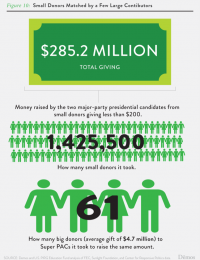Voters Reject Big Money in Politics, Now It’s Time for Reform
Voters sent a message last Tuesday, showing resounding support for our leaders to take steps to deal with the outsized influence of big money in our elections, including a resolution passed in Eau Claire County, WI endorsing a Constitutional Amendment to overturn Citizens United.
In this election cycle, outside groups spent over $1 billion, much of it through Dark Money groups who do not disclose their donors. Yet many of the candidates backed by big money lost their races, leading many in the media to claim that Citizens United may not be that big of a deal, and that corporate money in our elections won’t be a major problem for our democracy.
However, such a conclusion misses the point. While it is encouraging to see that voters were not swayed by the insane amounts of money spent and made their own evaluations, the issue of money in politics is not primarily about who wins. The real problem is that unlimited outside spending allows wealthy individuals, special interests, and corporations to shape the terms of our political debate and control who is able to even attempt a run for office. Anyone watching television, especially here in Wisconsin, during the last few months knows that the outside spending led to political discourse dominated by nasty and often misleading attack ads. The Thompson-Baldwin senate race drew the second-most outside spending of any senate race in the country and was relentlessly negative as outside groups ran a barrage of ads attacking both candidates’ character[1]. This detracted from candidates’ ability to have an honest conversation with the people of Wisconsin about their policy positions. Furthermore, it means that any candidate without the backing of wealthy individuals or interests is likely to be drowned out by a flood of big money.
The dominance of political spending by large donors tilts the playing field too far toward the wealthiest Americans. This election cycle at least 1.4 million Americans made small donations o
f $200 or less to support their candidate for president. This $285 million in grassroots support was matched by just 61 individuals, giving an average of $4.7 million each to Super PACs. The distorted rules of the game currently allow just 61 very wealthy people to match the voice of over a million average Americans.

The American people made their position on this abundantly clear on Tuesday. We reject the transformation of our elections into auctions between big-money bidders. Americans across party lines supported ballot measures rejecting big money’s hold on our politics. Voters in Colorado, which went for President Obama, passed a ballot measure with 73% of the vote directing its representatives to work for a Constitutional Amendment overturning Citizens United. Voters in Montana, who overwhelmingly supported Governor Romney for president, also passed a resolution with 75% support rejecting the idea that money is speech and corporations are people. Right here in Wisconsin, 71% of voters in Eau Claire County supported a similar amendment.
The people have spoken. In the short term, there are steps that policymakers can take to blunt the impact of big money in politics: pass the DISCLOSE Act at the state and federal levels requiring that corporate political contributions are transparent and pass Shareholder Protection acts that require companies to notify and get approval from shareholders before putting money into political campaigns. However, these are only band-aids and in the long term, Congress must move toward amending the Constitution to overturn the Citizens United decision and allow for limits on campaign contributions. This will take a massive grassroots effort. We’re ready for this fight.
[1] http://www.wisconsinwatch.org/2012/10/26/baldwin-thompson-senate-race-se…